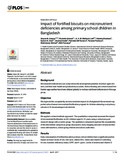Impact of fortified biscuits on micronutrient deficiencies among primary school children in Bangladesh

View/
Date
2017-04-05Publisher
© 2017 Plos OneAuthor
Adams, Alayne M.Ahmed, Rushdia
Latif, A. H. M. Mahbub
Rasheed, Sabrina
Das, Sumon K.
Hasib, Enamul
Farzana, Fahmida Dil
Ferdous, Farzana
Ahmed, Shahnawaz
Faruque, ASG
Metadata
Show full item recordCitation
Adams AM, Ahmed R, Latif AHMM, Rasheed S, Das SK, Hasib E, et al. (2017) Impact of fortified biscuits on micronutrient deficiencies among primary school children in Bangladesh. PLoS ONE 12(4): e0174673. https://doi.org/10.1371/journal.pone.0174673Abstract
Background
Micronutrient deficiencies can compromise the development potential of school-aged children, and their later health and productivity as adults. School feeding and school-based fortification approaches have been utilized globally to redress nutritional deficiencies in this age group.
Objective
We explored the acceptability and micronutrient impact of a Bangladesh Government supported school-based micronutrient fortification program for children attending rural primary schools in 10 disadvantaged sub-districts.
Methods
We applied a mixed methods approach. The quantitative component assessed the impact of micronutrient fortification on 351 children aged 6–11 years using a cohort pre-post research design with a control group. The qualitative component explored the acceptability of the intervention using focus group discussions, body mapping and semi-structured interviews with teachers, school-going children and school authorities.
Results
Daily consumption of fortified biscuits by primary school children had a significant positive impact on mean levels of iron, folic acid, vitamin B12, retinol and vitamin D controlling for sex, baseline deficiency status, CRP, and H. pylori. Levels of anemia and vitamin D deficiency were also significantly reduced. Qualitative findings indicated the widespread acceptability of the daily biscuit. Teachers perceived students to be more attentive in class, less tired, and some attributed better school performance to biscuit consumption. Children reported similar improvements in concentration and energy levels.
Conclusions
This study is among the first in Bangladesh to comprehensively assess a school-based fortification program in terms of its acceptability and impact on micronutrient status of children aged 6–11 years of age. While results strongly support this modality of school feeding, research on the cognitive impacts of micronutrient fortified biscuits will help clarify the case for scaled-up investments in school- based feeding program in Bangladesh and other low and middle income countries.
Description
This article was published in the Plos One [© 2017 Plos One] and the definite version is available at : https://doi.org/10.1371/journal.pone.0174673 . The Journal's website is at: http://journals.plos.org/plosone/article?id=10.1371/journal.pone.0174673Type
ArticleCollections
- Article [2]
- Journal Articles (2017) [6]
